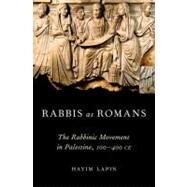Rabbis as Romans The Rabbinic Movement in Palestine, 100-400 CE
, by Lapin, Hayim- ISBN: 9780195179309 | 0195179307
- Cover: Hardcover
- Copyright: 7/31/2012
Conventionally, the history of the rabbinic movement has been told as a distinctly intra-Jewish development, a response to the gaping need left by the tragic destruction of the Jerusalem temple in 70 CE. In Rabbis as Romans, Hayim Lapin reconfigures that history, drawing attention for thefirst time to the extent to which rabbis participated in and were the product of a Roman and late-antique political economy. Lapin discusses how rabbis as a group were relatively well off, literate Jewish men, a kind of sub-elite in most provinces of the Roman empire. That rabbis were deeplyembedded in a wider Roman world is clear from their marriage choices, the rhetoric they used to describe their own group (often mirroring that used for Greek philosophical schools), their open embrace of Roman bathing habits, and their ambivalence towards theaters and public entertainments. Rabbis also form one of the most accessible and well-documented examples of a "nativizing" traditionalist movement in a Roman province. It was a movement committed to articulating the social, ritual, and moral boundaries between an Israelite "us" and everyone else. To attend seriously to thecontradictory position of rabbis as both within and outside of a provincial cultural economy, says Lapin, is both to uncover the historical contingencies that shaped what later generations understood as simply Judaism and to reexamine in a new light the cultural work of Roman provincializationitself.






